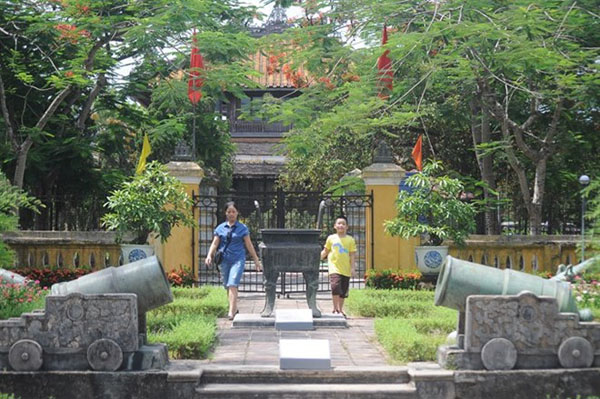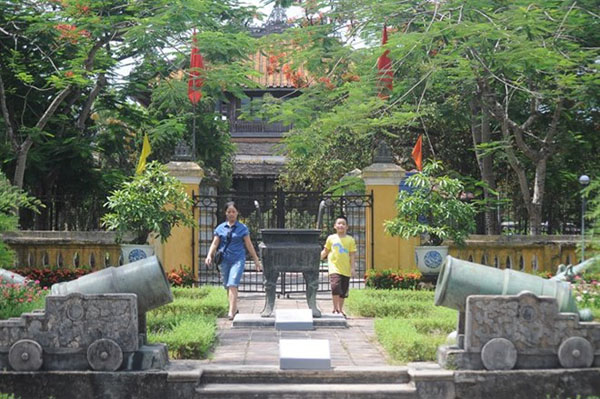
Hue city in central Thua Thien-Hue province has issued strict regulations on what to wear when visiting its monuments in an attempt to ensure solemnity of the key buildings that once belonged to the Nguyen Dynasty (1802-1945).

Wearing shorts is
prohibited at solemn places inside Hue monuments since the first of July.
(Photo: VNA)
The Hue Monuments Conservation Centre, a body of local authorities that manages
monuments related to the dynasty around the former imperial capital city,
regulated that visitors will have to wear decent clothing when they visiting
solemn monuments from the first day of July.
In particular, shorts, revealing skirts and singlets are prohibited in solemn
areas, including palaces in which kings once banned the entry of women and
temples where the kings and their ancestors are worshipped.
The centre provides a clothes renting service for those visitors wearing
prohibited clothing but wish to enter the solemn places, which are marked by
signposts depicting the banned clothing.
According to the centre’s Director Phan Thanh Hai, the centre had informed
travel agencies nationwide on the clothing ban, so that agencies were ready
ahead of the date from when the ban took effect.
Banning indecent clothing at solemn places of the dynasty is aimed at reducing
charges of desecration.-
Source: VNA
The emulation movement "Hoa Binh joining hands to build new-style rural areas” has been widely spreading, becoming a driving force that motivates the localities to renew rural landscapes and improve the material and spiritual lives of the residents. In this movement, the people play a central role-both as the main implementers and direct beneficiaries of its outcomes.
In response to the global digital revolution, Hoa Binh Newspaper is transforming itself into a modern and multi-platform media hub, blending cutting-edge technology with a restructured newsroom and a new generation of tech-savvy journalists.
Hoa Binh province’s Association of the Elderly recently held a conference to review the project on expanding the inter-generation self-help club model until 2025.
In a move to implement Resolution No. 57-NQ/TW, issued on December 22, 2024 by the Politburo, which targets breakthroughs in science-technology development, innovation, and digital transformation, the Hoa Binh provincial Department of Health has issued a plan to roll out the "Digital Literacy for All” campaign within the local health sector.
An Nghia Commune (Lạc Sơn District) is one of the communes that achieved the tha standard of the national new rural area in 2018. Entering a new development phase, the commune is now trying to meet the criteria for the advanced new rural development. With the strong political will and the public consensus, the commune is gradually overcoming the challenges to reach this goal, aiming for the sustainable development.


